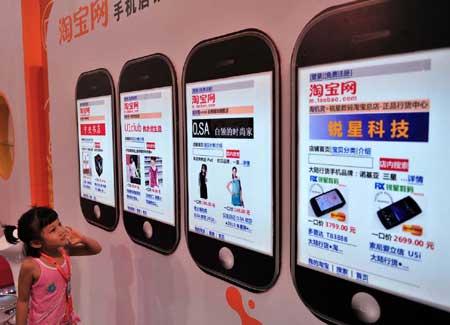
A girl watches a Taobao.com ad at a trade fair in Guangzhou. The robust development of e-commerce websites such as Taobao has spurred the usage of online payment in China. [China Daily]
Although China's newly launched second-generation online banking service will make it easier for users to conduct online transfers, it is unlikely to seriously impact the business of the nation's third-party online payment providers such as Alibaba and 99Bill.
As the new online banking system mostly serves commercial banks, its appeal to ordinary customers would be limited, said industry players and experts.
The People's Bank of China, the nation's central bank, launched its second-generation online banking service super e-banking system on Aug 30, allowing customers to make interbank balance and interbank transfer inquiries.
Media reports said that the central bank will also launch new services like third-party payment soon, posing a threat to third-party payment firms.
"In fact, the super e-banking system won't impact third-party online payment, because it has a different function," said Cao Fei from the research firm Analysys International.
He noted that the new bank service system is an internal one between commercial banks and, as such, it will not impact the end-customer third-party payment business.
Alibaba's Alipay, the country's largest online payment company, said it did not envisage the super e-banking system having any impact on it.
"We are doing different things," said Wang Ziling, a spokesman for Alipay. "The central bank's system offers a solution for commercial banks, while we offer a solution for end users and companies."
He noted that Alipay plays an arbitration role for consumers who buy products on the Internet, which is a function the super e-banking system doesn't possess.
According to figures from Internet analysis company iResearch, China's third-party payment turnover reached 208.3 billion yuan ($31 billion) in the second quarter of this year, up 86.8 percent year-on-year.
The figure is expected to hit 255 billion yuan in the third quarter of this year, according to iResearch.
In June, the central bank launched a new regulation that requires non-bank payment service providers to obtain a license in order to conduct third-party payment transactions in China.
Under the new rules, the companies will have to report to the central bank the commission rates they charge for third-party transactions. The regulation, which came into effect on Sept 1, requires existing payment institutions to obtain payment service operation permits by Aug 31, 2011.
Guan Guoguang, general manager of 99Bill, one of China's biggest third-party payment providers, said the central bank's regulation is good news for his company because it will help kick unqualified operators out of the market.
He said that his company is applying for the license from the central bank.
Cao from Analysys International said that it would not be difficult for most major third-party companies such as Alibaba's Alipay and 99Bill to get licenses from the central bank.
He said that the central bank's new regulations will help the long-term development of China's online payment market.
China's online payment industry has been growing at more than 100 percent annually over the past five years. It has also been attracting more and more players.
According to industry research, there are more than 100 online payment companies in the country at present.





